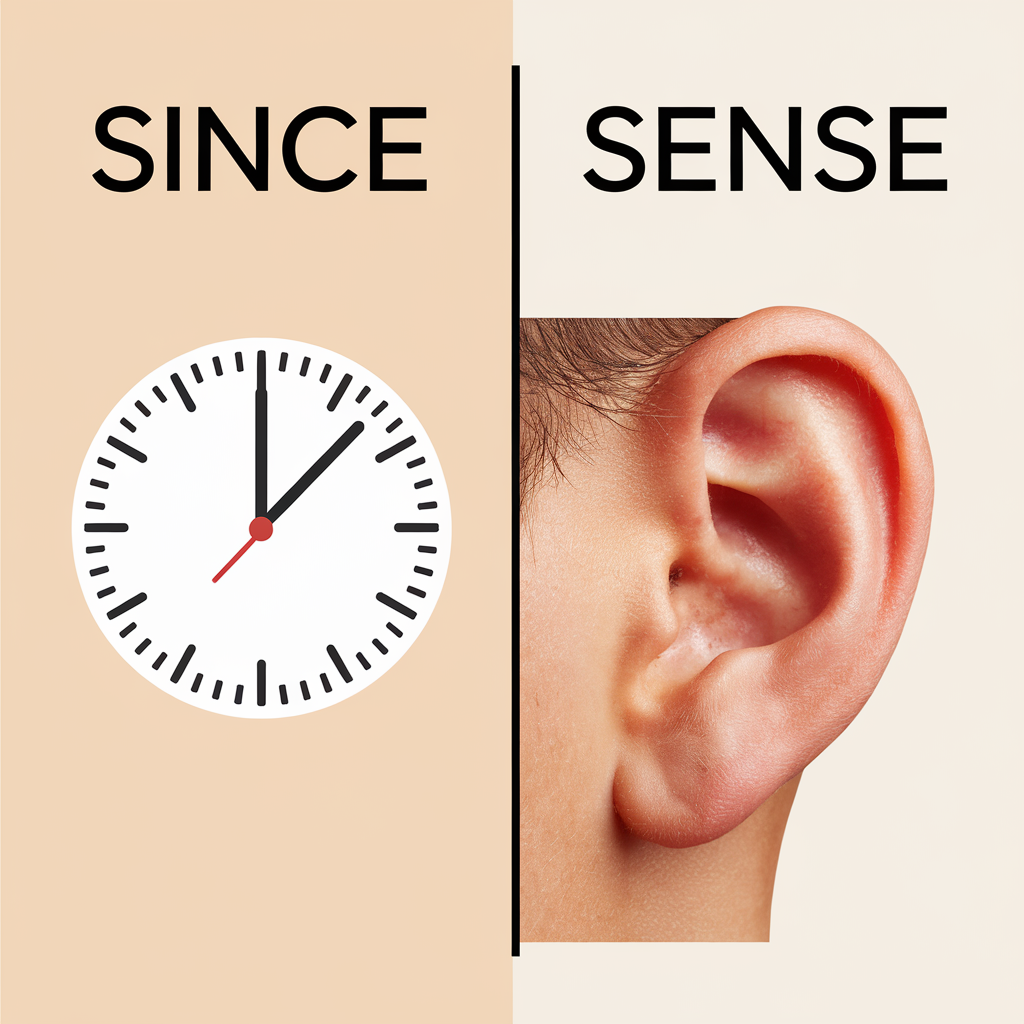Introduction
English grammar is full of words that look or sound alike but have completely different meanings. One common confusion arises with since vs. sense. While both words are frequently used in conversation and writing, they serve distinct purposes.
Misusing these words can lead to misunderstandings and awkward sentences. In this article, we’ll break down the differences between “since” and “sense,” explain their meanings, and show you how to use them correctly. We’ll also provide examples, grammar tips, and memory tricks to ensure you never confuse them again.
What Does “Since” Mean?
The word since can function as a conjunction, preposition, or adverb and is primarily used to refer to time or reason.
Usage of “Since” in Time Contexts
When “since” refers to time, it indicates that something started in the past and continues to the present.
- Example: “I have lived in New York since 2015.”
- Explanation: The event (living in New York) started in 2015 and is still ongoing.
More Examples:
- “She has been my best friend since childhood.”
- “We have been waiting since morning.”
Read More About This Article: The Correct Past Tense of “Arise” – A Complete Guide
Usage of “Since” in Reason Contexts
“Since” can also mean “because” or “as a result of” when explaining a reason.
- Example: “Since it was raining, we stayed indoors.”
- Explanation: The reason for staying indoors is the rain.
More Examples:
- “Since you are new here, let me show you around.”
- “Since she apologized, I forgave her.”
What Does “Sense” Mean?
The word sense is a noun that refers to perception, awareness, or meaning.
Different Meanings of “Sense”
- Physical Perception (Five Senses)
- Example: “The sense of smell is powerful.”
- Explanation: Refers to the ability to detect odors.
- Awareness or Intuition
- Example: “He has a strong sense of direction.”
- Explanation: Describes a person’s ability to navigate.
- Meaning or Logical Interpretation
- Example: “That sentence doesn’t make sense.”
- Explanation: Questions the clarity or logic of the sentence.
- Feeling or Emotional State
- Example: “I had a sense of excitement before the trip.”
- Explanation: Describes an emotional experience.
- Significance or Importance
- Example: “This meeting has no real sense.”
- Explanation: Implies a lack of purpose or meaning.
Since vs. Sense: Key Differences
To make the distinction clearer, let’s look at the fundamental differences in a table:
| Feature | Since | Sense |
|---|---|---|
| Part of Speech | Conjunction, Preposition, Adverb | Noun |
| Meaning | Refers to time or reason | Refers to perception, awareness, or meaning |
| Example in Time Context | “Since last year, I have been studying.” | ❌ (Not applicable) |
| Example in Reason Context | “Since it was late, we left early.” | ❌ (Not applicable) |
| Example in Perception Context | ❌ (Not applicable) | “I lost my sense of smell.” |
| Example in Logical Meaning | ❌ (Not applicable) | “That explanation makes sense.” |
Common Mistakes & How to Avoid Them
Mistake #1: Using “Sense” Instead of “Since” in Time-Related Sentences
- ❌ Incorrect: “Sense last week, I have been working out.”
- ✅ Correct: “Since last week, I have been working out.”
Mistake #2: Using “Since” Instead of “Sense” for Perception or Meaning
- ❌ Incorrect: “I have a strong since of danger.”
- ✅ Correct: “I have a strong sense of danger.”
Quick Fix:
- If referring to time or reason, use “since.”
- If referring to perception, meaning, or awareness, use “sense.”
Memory Tricks to Remember the Difference
Mnemonic Device
- “Since refers to time or reason.“
- “Sense refers to awareness, perception, or meaning.“
- Example sentence using both: “Since you left, I’ve had no sense of direction.”
Visualization
- Imagine “since” as a timeline, linking past to present.
- Imagine “sense” as a light bulb representing understanding or perception.
Exercises to Master Usage
Try filling in the blanks with either “since” or “sense”:
- “I have been working here _______ 2020.”
- “He has no common _______.”
- “She left early _______ she wasn’t feeling well.”
- “Do you have a _______ of danger?”
- “They have been dating _______ high school.”
(Answers: 1. since, 2. sense, 3. since, 4. sense, 5. since)
Conclusion
Understanding the difference between since vs. sense is essential for clear and precise communication.
- Use “since” for time and reasons.
- Use “sense” for perception, awareness, and meaning.
By practicing these distinctions, you can improve your writing and avoid common grammar mistakes. Keep these rules in mind, and soon, choosing the right word will become second nature!
